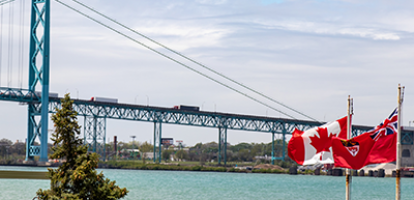From: Daniel Schwanen
To: The Honourable Chrystia Freeland
Date: July 6, 2018
Re: A New Coalition for Trade in the Era of Trump
On June 6, 2017, in a much remarked speech in the House of Commons, you rightly extolled the virtues of a global order based on rules, including rules promoting, as you put it, “free and friendly trade.”
As you noted, it is clear that the order carefully built by earlier generations is under great stress. Recent actions and pronouncements by the US administration threaten to shrink global trade and its attendant prosperity. Meanwhile, China, while moving toward greater trade openness in some respects, is in other respects acting in ways that many perceive as damaging to fair competition and even to global security.
In response to these unprecedented challenges, Canada needs to play a leading role in charting a clear path toward more open trade waters, not just for itself but for all countries that are like-minded on trade and on key security questions, implying countries that also uphold at least basic political and civil liberties.
Canada should take a leadership role by convening a meeting of representatives from these countries, and any who want to attend as observers, with the immediate goal of consolidating and catalyzing trade openness.
The aim would be to agree to:
- Lower all tariffs applying to goods originating within the group to zero over a reasonably short period, subject to an agreed-upon, limited overall value of potential trade that could remain subject to duties at each country’s discretion, since no country will politically be able to go to zero on absolutely everything.
- Develop and implement simple rules of origin that would apply to all trade within the group; and a protocol on the cumulation of origin between themselves and other parties with which they have free trade agreements, describing which goods originating in these other countries could count as circulating tariff-free within the group.
- Extend national and most favoured nation treatment, and other basic legal protections to each other’s goods and nationals.
- Not raise tariffs and quotas, or impose discriminatory trade, regulatory, investment or public procurement barriers vis-à-vis each other, or give new trade preferences to third parties that they wouldn’t extend to each other; except in accordance with WTO agreements or other existing agreements among them.
- Ensure that the agreement meets the requirements of a free trade area under Article XXIV of the GATT 1994.
- Establish committees to monitor the implementation of the agreement and any further accession to it, and to help resolve any dispute.
The agreement would be open to WTO members in good standing: (a) who are treated as market economies by countries representing a large portion of the group’s GDP; and (b) who uphold minimal political right and civil liberties – amounting to the right of peaceful, open dissent with government policies without fear of reprisal and contestability of elections; or (c) who are currently in a customs union with a member of the group.
I estimate that this group would potentially cover between 47 and 53 percent of the world’s GDP depending on the willingness of large still emerging economies like Brazil, India or Indonesia to participate.
This initiative would be compatible with Donald Trump’s musings about barrier-free trade at the recent G7 summit in Charlevoix; it would be reciprocal among members except for a reasonably low value limit within which each country could choose to continue to restrict any trade not already free; and it would advance trade liberalization among the widest possible group of compatible economies including, should it choose to join, the United States.
In addition, almost all the world’s other economies could benefit from the provisions for cumulation of rules of origin between the group and its member’s other free trade partners. As such, the idea would be to provide the foundation for broad-based liberalization, ideally further pursued at the WTO.
In short, Minister, the objective of this group would be to preserve and build on the achievement of earlier generations, as you called for in your 2017 speech. It would do so by boldly demonstrating the way to enhance free, friendly, and economically beneficial global trade, in spite of the current less-than-friendly attempts by formidable forces to roll back over 60 years of multilateral achievements.
Daniel Schwanen is Vice President, Research at the C.D. Howe Institute
To send a comment or leave feedback, email us at blog@cdhowe.org.
The views expressed here are those of the author. The C.D. Howe Institute does not take corporate positions on policy matters.





